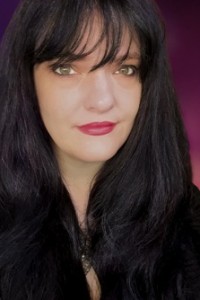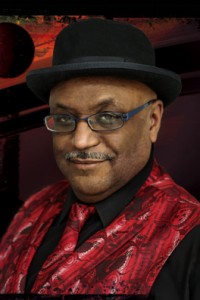Jack Vance: Go for Broke
 John Holbrook Vance was born August 28, 1916 in San Francisco CA. He worked as a bellhop, in a cannery, and on a gold dredge before attending the University of California, Berkeley, where he studied engineering, physics, and journalism, though he never graduated. A lifelong musician and music lover, Vance’s first published works were jazz reviews for The Daily Californian.
John Holbrook Vance was born August 28, 1916 in San Francisco CA. He worked as a bellhop, in a cannery, and on a gold dredge before attending the University of California, Berkeley, where he studied engineering, physics, and journalism, though he never graduated. A lifelong musician and music lover, Vance’s first published works were jazz reviews for The Daily Californian.
Vance worked as an electrician at Pearl Harbor in Hawaii, leaving the area a month before the December 1941 attack that brought the US into WWII. His poor eyesight made it impossible for him to serve in the military, but he memorized an eye chart and joined the Merchant Marine. He wrote his first published story, ‘‘The World-Thinker’’ (1945), while at sea. Before becoming a full-time writer in the 1970s, he worked as a seaman, surveyor, and carpenter, among other occupations. He married Norma Genevieve Ingold in 1946; she died in 2008. Vance traveled the world extensively, living and writing in Tahiti, South Africa, Italy, and Kashmir, among other locales.
He published short fiction in the pulps in the late ’40s and early ’50s, contributing regularly to Startling Stories and Thrilling Wonder Stories. Notable short works include ‘‘Telek’’ (1952), ‘‘The Moon Moth’’ (1961), and Hugo- and Nebula-award winning novella ‘‘The Last Castle’’ (1966). Some of his short fiction was collected in Future Tense (1964), The World Between, and Other Stories (1965), Eight Fantasms and Magics (1969), The Best of Jack Vance (1976), Green Magic (1979), Lost Moons (1982), The Narrow Land (1982), Light from a Lone Star (1985), The Dark Side of the Moon: Stories of the Future (1985), Galactic Effectuator (1985), The Augmented Agent, and Other Stories (1986), Chateau D’If, and Other Stories (1990), When the Five Moons Rise (1992), and The Jack Vance Treasury (2007). His Magnus Ridolph SF stories were collected in The Many Worlds of Magnus Ridolph (1966; expanded 1984 as The Complete Magnus Ridolph).
Vance’s landmark Dying Earth sequence, set in the far future, began with collection The Dying Earth (1950) and continued with novel The Eyes of the Overworld (1966), Cugel’s Saga (1983), Rhialto the Marvelous (1984), and several related stories. Vance redefined the nature of planetary romance with his Big Planet (1952), and continued exploring that universe in sequel Showboat World (1975).
Most of Vance’s novels take place in series. Major works include the Demon Princes sequence: The Star King (1964), The Killing Machine (1964), The Palace of Love (1966), The Face (1979), and The Book of Dreams (1981); the Planet of Adventure series: City of the Chasch (1968), Servants of the Wankh (1969), The Dirdir (1969), and The Pnume (1970); the Durdane trilogy: The Anome (1971), The Brave Free Men (1973), and The Asutra (1974); the Alastor Cluster sequence: Trullion: Alastor 2262 (1973), Marune: Alastor 933 (1975), and Wyst: Alastor 1716 (1978); the Lyonesse fantasy series: Suldrun’s Garden (1983), The Green Pearl (1985), and World Fantasy Award-winner Madouc (1989); the Cadwal Chronicles: Araminta Station (1987), Ecce and Old Earth (1991), and Throy (1992); and the Ports of Call series: Ports of Call (1998) and Lurulu (2004).
Standalone SF/fantasy works include The Space Pirate (1953), Vandals of the Void (1953), To Live Forever (1956); The Languages of Pao (1957); Slaves of the Klau (1958), Hugo Award-winner The Dragon Masters (1963), Son of the Tree (1964), The Houses of Iszm (1964), Space Opera (1965), Monsters in Orbit (1965), The Brains of Earth (1966), The Blue World (1966), Emphyrio (1969); The Gray Prince (1974), Maske: Thaery (1976), and Night Lamp (1996).
He also wrote a number of mystery novels in the ’60s, with one, The Man in the Cage (1960), winning an Edgar Award. Vance wrote for Ellery Queen and also wrote scripts for the TV show Captain Video. His autobiography, This Is Me, Jack Vance! (2009), won a Hugo for best Related Book.
Books about Vance include Jack Vance, Tim Underwood & Chuck Miller, eds. (1980); The Jack Vance Lexicon: From Ahulph to Zipangote: The Coined Words of Jack Vance, Dan Temianka, ed. (1992); and Vance Space, Michael Andre-Driussi (1997). Anthology Songs of the Dying Earth, edited by George R.R. Martin & Gardner Dozois (2009), includes original stories written in Vance’s honor.
Vance is one of the most influential SF authors from the postwar period, and his work inspired authors including Avram Davidson, Harlan Ellison, Matthew Hughes, George R.R. Martin, Michael Moorcock, and Gene Wolfe. He won the World Fantasy Award for lifetime achievement in 1984; the SFWA Grand Master Award in 1997; and he was inducted into the Science Fiction Hall of Fame in 2001. He lives in Oakland CA.
Excerpts from the interview:
‘‘I’ve always let my writing speak for itself. I’m not going to go around bragging about anything. If anyone likes the stuff, they’ll find out, and if they don’t like it, they won’t. Apparently I’ve got a pretty good reputation.
 ‘‘I don’t read any science fiction or fantasy anymore. It leaves me cold. I just read non-fiction and history and detective stories, once in a while a western story. I’ve not read science fiction or fantasy for recreation since I was a kid. I used to subscribe to Weird Tales. I remember running out to the mail box – I had to run a quarter mile to get to it, we lived out in the country – to grab Weird Tales, and taking it back.
‘‘I don’t read any science fiction or fantasy anymore. It leaves me cold. I just read non-fiction and history and detective stories, once in a while a western story. I’ve not read science fiction or fantasy for recreation since I was a kid. I used to subscribe to Weird Tales. I remember running out to the mail box – I had to run a quarter mile to get to it, we lived out in the country – to grab Weird Tales, and taking it back.
‘‘I wrote to make money, not for any other purpose. I just wrote the stuff because I was pretty good at it, and I wrote as fast as I could. I don’t glorify my writing at all. For some reason I have the knack. I can’t take any credit for it, any more than you can take credit for being a beautiful girl.”
…
‘‘I remember one time Fred Pohl and I were at some kind of convention up in Reno. I went up to him and said, ‘Hey there, Fred!’ He looked at me and said, ‘Who are you?’ and I got mad and said, ‘Go to hell, I’m not going to tell you.’ I walked away from him and was standing on the stairs there, and 15 minutes later he walked up and said, ‘Jack Vance, you son of a bitch, you.’ He was editor of Galaxy at the time. My agent sold him a story, but he’d sold it to someone else first as well, so he got Galaxy’s money and the other guy’s money too. Fred Pohl couldn’t publish the story. He called me and was mad at me. I was in Tahiti at the time. He said, ‘Give me that money back!’ So I wrote him one called ‘The Last Castle’ instead, which he was happy for.”
…
‘‘Come to think of it, I do like most of my books. I did so much of my writing while travelling. My wife Norma would type for me. Poor Norma. She worked harder than I did. She was such a wonderful lady. I miss the hell out of her. Here’s how we met. I was working. I looked over the fence and there was this girl on a porch, playing with a kitten. She was petting it and being nice to it. I looked over and I thought, ‘She’s being nice to the cat. I wonder if she’d be nice to me?’ So I asked her for a glass of water. She ran into the house, came out and gave me a glass of water, I got to talking to her, and a while later we were married. She was a sophomore at Cal, the University of California, at the time.
‘‘I never was a good-looking guy. You can see my picture; I’m pretty ordinary looking. The girls never chased me much, but they never chased me away. Do you think I look my age now? I hate to tell you how old I am. I don’t feel my age. Obviously I don’t act like it.”
…
‘‘I’m recording some music with my friend Kevin Boudreau. We call ourselves the Go For Broke Jazz Band. I’m going to sell CDs as well as e-books on my website, . I play harmonica, ukelele, and jug, and do vocals and play kazoo, and Kevin plays string bass and the washboard. Do you think anybody’s interested in buying Jack Vance music?
‘‘We used to have jam sessions around here all the time. I used to play professionally at two or three different places. If I was any good at playing cornet I wouldn’t be bashful about letting you know, but if I’m honest, I’m just barely able to play it.
‘‘My mother played piano. These people used to come stay with us, and one time they brought up this guy George Gould. He was a wonderful jazz musician, and had a wonderful orchestra in San Francisco. When I was nine years old I heard jazz music for the first time, and it’s haunted me all my life. Jazz puts dopamine in your brain. There are other things that send dopamine into your brain, including sex. I think if you’ve had a lot of fun in your life, it changes your brain. I’m serious about this. I think if you did some research, you’d discover that if you have a lot of fun, it keeps you young. That’s a theory of mine and I don’t see any reason not to believe it’s true. Have as much fun as you can with your life. You see people going around that have bad things happen to them all their lives, and they are just dreary, and they die early.”





Vance underplays his interest in writing. His manuscripts show that he took lots of care and did many revisions to get things just the way he wanted. LeGuin was right in saying he has “an achieved style”. Also, he didn’t write just for money. Writing was his job, but he pursued it because he wanted independence and freelancing gave him that. He’s not a nine to five, hop up and down for the boss kind of guy.
I was fascinated to learn (from one of Scott’s visits with Jack) that The Man in the Cage was adapted for the show Thriller. I love those vintage anthology shows and now I really want to see Jack’s episode!
It’s nice to see Vance interviewed. Great that the SF/F community are still interested in him and his work. I have noticed that many younger readers are reading his (and other older writers’) books and discussing them. All too often in this country, people over 60 are ignored, and when they aren’t, they are treated with condescension and barely hidden contempt.
I have spoken to Mr.Vance on the phone a few times and found him very sharp of wit and knowledgeable about many subjects. We had a two-hour conversation and it was absolutely thrilling to speak with the writer of those excellent books and stories. For those interested in reading his stuff, he has a website where many titles are available in several formats. The site is updated every two months with new titles and will be until the entire Vance catalog is available. He even has a free ebook, the first in the Planet of Adventure series, The Chasch, available on the site. The book and the series is wonderful. http://www.jackvance.com
Long live Jack Vance!
A true living legend. It’s quite moving to hear the words of someone of his age reflecting back on a life well lived, and on his late wife.
This interview is particularly interesting, I translated it into French for my friends Vance fans. Here we consider Jack Vance as a considerable author who stands out above everything else in SF even today. His elegant, concise and ironic style is particularly appreciated (we’ve had good translators fortunately).
In 2019 we had the publication of the complete short stories (more than 2000 pages!) which has not yet been done in the US…. And this year especially(2020), there have been 5 more publications of his novels and soon a comic book of Demon princes!
I understand that it’s about the same all over Europe and in Russia too.
Thanks to Jack Vance, and Locus.